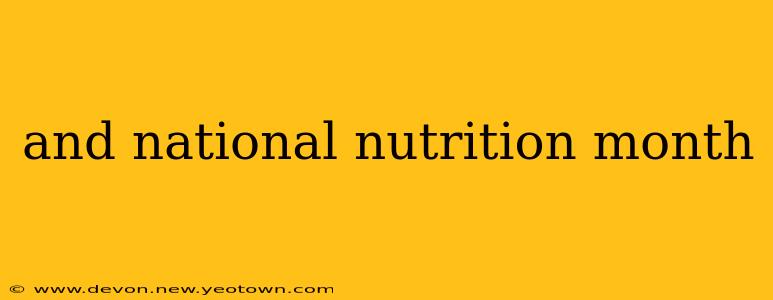March is National Nutrition Month, a time dedicated to focusing on the importance of making informed food choices and developing healthy eating habits. It's not just about dieting; it's about nourishing your body and mind for optimal well-being. This year, let's embark on a journey to understand the core principles of good nutrition and how they can transform your life. Imagine a world where you feel energized, focused, and confident – that's the power of proper nutrition.
What is National Nutrition Month?
National Nutrition Month, spearheaded by the Academy of Nutrition and Dietetics, is an annual campaign promoting the importance of healthy eating. It's a chance to reflect on our relationship with food, to learn about the science behind nutrition, and to discover practical strategies for making positive changes. It's not a quick fix; it's about long-term lifestyle adjustments that contribute to overall health and happiness. Think of it as a yearly checkup for your eating habits.
What are the benefits of healthy eating?
The benefits extend far beyond simply maintaining a healthy weight. Healthy eating is intricately linked to improved energy levels, better mood, stronger immunity, reduced risk of chronic diseases (like heart disease, type 2 diabetes, and certain cancers), sharper cognitive function, and even better sleep. It's a holistic approach to well-being, impacting every aspect of your life.
What are some simple ways to improve my diet?
This is where the magic truly happens. Small, sustainable changes make a world of difference. It's not about drastic overhauls but about gradual integration of healthier choices.
- Focus on whole foods: Prioritize fruits, vegetables, whole grains, lean proteins, and healthy fats. These provide essential nutrients your body needs to thrive.
- Hydration is key: Drink plenty of water throughout the day. Water aids digestion, regulates body temperature, and keeps you feeling full.
- Mindful eating: Pay attention to your hunger and fullness cues. Avoid distractions while eating and savor your food.
- Limit processed foods, sugary drinks, and unhealthy fats: These often lack nutritional value and can contribute to weight gain and health problems.
- Read food labels: Become familiar with nutrition facts and ingredient lists. This empowers you to make informed choices.
- Plan your meals: Planning ahead helps you make healthier choices and avoid impulsive, unhealthy snacks.
- Seek professional guidance: Consult a registered dietitian or nutritionist for personalized advice. They can help you create a plan tailored to your individual needs and goals.
How can I make healthy eating affordable?
Healthy eating doesn't have to break the bank. Here are some budget-friendly strategies:
- Buy seasonal produce: Fruits and vegetables in season are usually cheaper and tastier.
- Cook at home more often: Eating out is significantly more expensive than cooking at home.
- Plan your grocery shopping: Create a list and stick to it to avoid impulse buys.
- Buy in bulk (when appropriate): Certain staples like grains and beans can be more affordable when purchased in bulk.
- Utilize leftovers creatively: Transform leftovers into new meals to minimize food waste and save money.
What are some common nutrition myths?
There's a lot of misinformation surrounding nutrition. Let's debunk some common myths:
- Myth: All fats are bad. Truth: Healthy fats (like those found in avocados, nuts, and olive oil) are essential for good health.
- Myth: Skipping meals helps with weight loss. Truth: Skipping meals can lead to overeating later and hinder metabolism.
- Myth: Detox diets are necessary. Truth: Your liver and kidneys naturally detoxify your body. Focus on a balanced diet instead.
- Myth: Calories are the only thing that matters. Truth: The quality of calories matters just as much as the quantity. Focus on nutrient-dense foods.
What resources are available to help me learn more about nutrition?
Numerous resources are available to support your journey towards healthy eating:
- The Academy of Nutrition and Dietetics: This organization offers a wealth of information on nutrition and healthy eating.
- Your doctor or healthcare provider: They can provide personalized advice and refer you to registered dietitians.
- Registered dietitians (RDs) and nutritionists: They are qualified professionals who can help you create a personalized nutrition plan.
- Reputable online resources: Numerous websites and apps offer nutrition information, but always verify the credibility of the source.
National Nutrition Month isn't just a month; it's a mindset. It's about cultivating a lifelong commitment to nourishing your body and mind. By making small, consistent changes, you can reap the incredible benefits of healthy eating and live a happier, healthier life. Embrace the journey, and remember that every small step counts.

